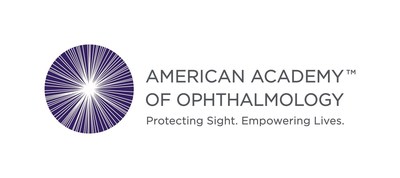American Academy of Ophthalmology offers advice on how people can take control of their health beyond medications and surgery
American Academy of Ophthalmology offers advice on how people can take control of their health beyond medications and surgery
SAN FRANCISCO, Jan. 21, 2019 /PRNewswire/ -- Glaucoma is one of the leading causes of vision loss, affecting about 3 million people in the United States. Because there are no symptoms early on, about half of people with the disease don't know they have it. Once vision is lost to glaucoma, it can't be regained. During Glaucoma Awareness Month in January, the American Academy of Ophthalmology is reminding the public that early detection and treatment, and some lifestyle choices can help protect your sight.

Glaucoma damages the optic nerve, which transmits visual information from the retina to the brain. Typically, the disease progresses slowly, gradually destroying peripheral vision. Because people are unaware of early peripheral vision loss, a patient can lose most of it before they even know they have glaucoma.
That's why the Academy recommends that everyone should have a comprehensive eye exam at age 40. This exam provides ophthalmologists – physicians who specialize in medical and surgical eye care – an opportunity to carefully examine the eye including the optic nerve for signs of damage and other possible problems that may affect vision. Individuals at greater risk for developing glaucoma include people:
- over age 40;
- of African, Asian or Hispanic heritage;
- who have high eye pressure detected during an eye exam;
- who are farsighted or nearsighted;
- who have experienced eye trauma or eye injury;
- whose corneas are thin in the center;
- or who have health problems such as diabetes, migraines, high blood pressure or poor blood circulation or other health problems affecting the whole body
Appropriate treatment for glaucoma depends on the specific type and severity of the disease. Medicated eye drops or laser treatments are the most common initial approach. These techniques work by lowering eye pressure to reduce the amount of fluid in the eye, and by increasing fluid outflow from the eye.
Beyond drugs and surgery, several recent studies suggest that lifestyle choices may also help minimize the risk of losing vision to glaucoma.
Exercise regularly. A study just published in Ophthalmology, the journal of the American Academy of Ophthalmology, showed that people who engaged in physical activity can slow vision loss from glaucoma.
Meditate. A new study published last month in the Journal Glaucoma showed that a relaxation program with meditation can lower eye pressure in glaucoma patients and improve their quality of life by lowering stress hormones like cortisol.
Don't use CBD as a "natural" glaucoma remedy. CBD, or cannabidiol, is the non-psychotropic component of cannabis and hemp being touted as a magical cure-all. A study published last month in Investigative Ophthalmology & Visual Science shows it actually raised eye pressure in mice.
Eat a diet rich in fruits and vegetables, especially green, leafy ones. One study showed that people who ate more leafy vegetables have a 20 to 30 percent lower risk of developing glaucoma. Why? Nitrates in green vegetables can be converted to nitric oxide, which can improve blood flow and help regulate pressure inside the eye.
Don't smoke. Smoking cigarettes increases the risk of glaucoma and has an overall negative impact on eye health.
Maintain a healthy body weight. People with a higher body mass index (BMI) are at increased risk for diabetes, and having diabetes puts people at risk of glaucoma. Having a too low BMI is also associated with increased glaucoma risk.
"Patients are often surprised when their ophthalmologist tells them they have glaucoma because they don't have symptoms," said Dianna Seldomridge, M.D., a clinical spokesperson for the American Academy of Ophthalmology. "That's why it's so important to have your eyes examined regularly; to detect the signs of disease you don't see. The good news is that today's innovative treatments and surgical techniques are better than ever."
Some Seniors May Be Eligible for Glaucoma Screening
For individuals age 65 or older who are concerned about their risk of eye disease, you may be eligible for a medical eye exam often at no out-of-pocket cost through the American Academy of Ophthalmology's EyeCare America® program. For those at increased risk for glaucoma, they may qualify for a glaucoma exam through EyeCare America. This public service program matches volunteer ophthalmologists with eligible patients in need of eye care across the United States. To see if you or a loved one qualifies, visit EyeCare America to determine your eligibility.
Find more information about eye health and how to protect your eyes on the Academy's EyeSmart website.
About the American Academy of Ophthalmology
The American Academy of Ophthalmology is the world's largest association of eye physicians and surgeons. A global community of 32,000 medical doctors, we protect sight and empower lives by setting the standards for ophthalmic education and advocating for our patients and the public. We innovate to advance our profession and to ensure the delivery of the highest-quality eye care. Our EyeSmart® program provides the public with the most trusted information about eye health. For more information, visit aao.org.
About EyeCare America®
Established in 1985, EyeCare America, the public service program of the American Academy of Ophthalmology, is committed to the preservation of sight, accomplishing its mission through public service and education. EyeCare America provides eye care services to medically underserved seniors and those at increased risk for eye disease. More than 90 percent of the care made available is provided at no out-of-pocket cost to the patients. EyeCare America is co-sponsored by the Knights Templar Eye Foundation Inc., with additional support provided by Genentech and Regeneron. More information can be found at www.eyecareamerica.org.
![]() View original content to download multimedia:http://www.prnewswire.com/news-releases/lifestyle-choices-may-help-glaucoma-patients-preserve-eyesight-300781749.html
View original content to download multimedia:http://www.prnewswire.com/news-releases/lifestyle-choices-may-help-glaucoma-patients-preserve-eyesight-300781749.html
SOURCE American Academy of Ophthalmology




